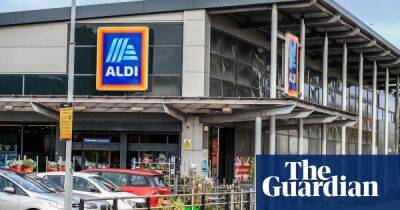‘Big four no more’: where now for UK grocers as Aldi overtakes Morrisons?
If you want to know how hard things are at the moment in the UK, look no further than the see-sawing fortunes of the big supermarkets.
With food prices racing and the country on the brink of recession, sales are flying at Aldi and Lidl while middle-class favouritesOcado and Waitrose are faltering as people try to save money on their food shop amid plummeting living standards.
This week Aldi became the UK’s fourth largest supermarket chain, ejecting Morrisons from a “big four” line-up that had remained roughly the same for nearly 20 years: Tesco, Sainsbury’s, Asda and Morrisons.
As Fraser McKevitt, the head of retail and consumer insight at the grocery analysts Kantar, put it, the “traditional big four is no more”.
This changing of the retail guard has been coming for a while. Aldi and Lidl exploded on to the scene during 2008 financial crisis, so in some respects there is a feeling of deja vu as the country experiences tough times.
Back then the little-known German grocers had an air of novelty: consumer trend-watchers talked of middle-class converts joining the “Aldi-rati”. That element of surprise is long gone. Aldi and Lidl have expanded rapidly and together have 1,900 stores and a market share of 16.4%. They rake in £1 in every £6 spent on groceries in UK.
The supermarket rankings are based on sales data from Kantar, with figures published this week showing Aldi’s sales up by nearly a fifth over the 12 weeks to 4 September. This boosted its market share to 9.3%, overtaking private equity-owned Morrisons on 9.1% – down from 9.8% a year ago.
Giles Hurley, the Aldi UK and Ireland chief executive, says shoppers are “prioritising value like never before” with the chain serving an extra 1.5 million customers over the past three
Read more on theguardian.com






















